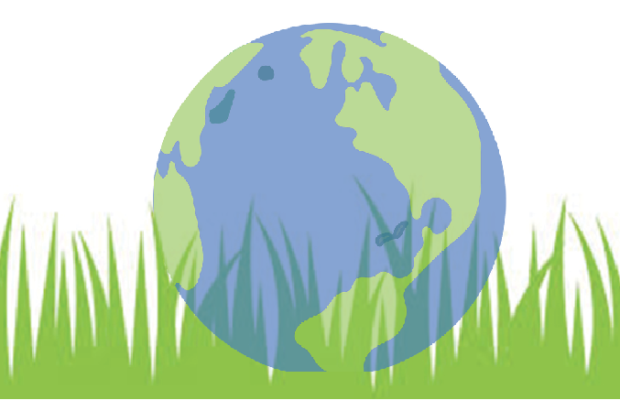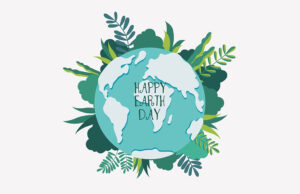Make every Day Earth Day

Based on research done by a non-profit organization called Plastic Pollution Coalition, as of weight, the oceans will contain more plastic than fish by the time the human race reaches 2050. Unfortunately, the irresponsible use of plastic is not the only apology we owe Mother Nature.
The earth is in the midst of its sixth mass extinction of plants and animals. One to two acres of rainforests are cleared every second; species go extinct in 100 to 1,000 times the natural rate, which means dozens of organisms give their last breaths each day. Of course, there are ways to help save our planet. Here are five.
Conserve Water
At current rates, less than three percent of world’s water is fresh andmuch of it is unreachable. Water means life, and most organisms need clean water to survive.
By conserving, we reduce the the energy of heating, pumping and treating water.
Less water equals less polluted runoffs into rivers, streams and groundwater aquifers, which affects the organisms living in ecosystems that rely on water that are unfortunately used as dumping sites. Rather than wasting water people die for, to watch your bath bombs dissolve for the millionth time, take a quick shower and hesitate using more water than needed.
Reduce, Reuse, Recycle
The amount of wasted, reusable materials (metal, plastic, paper etc.) in the oceans equals the size of India, Europe and Mexico combined. The three “R”s are one of the easiest ways to help save earth. Rather than buying what you want at its most, try to focus more on what you need and reduce the amount of litter.
Instead of using the same container for everything, use multiple ones to throw your reusable waste. Take five minutes of your time for a healthier future and visit:
- Cedar Falls Transfer Station – 1500 State Street
- Metro Area Redemption – 9301 University Avenue
- Or one of the 20+ recycling centers in the Cedar Valley area to recycle the reusable materials you have collected over time.
Stay Away From Plastic
Although it is a reusable material, plastic is the most dangerous of all. The amount of plastic manufactured in the first 10 years of this century eclipses the total produced in the entire last century. Plastic items can take up to 1,000 years to decompose in landfills as well as surviving thousands of years in water.
The heavy use of plastics not only harms our health because of their toxic ingredients such as Bisphenol, but also puts the life of animals in danger as well, including birds, fish, sea lions, sea turtles, dolphins and whales.
Try to bring a reusable shopping bag with you when you go for shopping. Use metal or glass straws, and use reusable containers regularly.
Although sometimes it is hard to not use plastic, recycling is always an option.
Go Vegan
Although it may seem like a very hard thing to do and expensive to afford, going vegan living is one of the best ways to get Mother Nature back on her feet.
Veganism is a solution to nearly everything listed above.
Vegans consume consume plants instead of livestock. The more livestock replaced with plants, the more water there will be to go around because it takes around 100-200 times more water to raise a pound of beef than it does to raise a pound of plant foods.
Just as they pollute water, livestock also erode and weaken soil. This is mostly because raising livestock usually leads to deforestation, which clears huge swaths of different elements such as trees that provide nutrients and resilience. On the other hand, growing plants nourishes soil and leads to long-term resilience.
Another pro of veganism is the consumption of energy. The raising of livestock costs more energy while plants can be raised with eight times less energy. Due to high consumption, the production of animal products pollutes the air more than all the different modes of transportation combined, but plants purify the air.
Further to its benefits, animals do not deserve to be abused and killed when surviving in a healthier way is possible.
Bike More Drive Less
In addition to its health benefits, biking is also an amazing wayto reduce air pollination. Bike riding uses minimal fossil fuels and is a way of pollution-free transport. According to research done by the Department of Transport and Main Roads, cycling to work, school or college on a daily basis would save about 3,306.9 pounds of greenhouse gas emissions each year.
Bicycles take far less energy to make and do not require toxic batteries or motor oil. Although some may think driving environmentally-friendly vehicles such as hybrids are pretty chill, hybrids are much larger than bikes, and require 14,000 pounds of carbon in the production for each. Most hybrids use nickel metal hydride batteries which are known as carcinogens, but also nickel mining is often done in open cast mines with all the attendant pollution that goes along with opening large holes in the ground. On the other hand, hybrids do use some gas to run while bikes don’t.









You must be logged in to post a comment Login